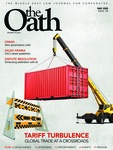Lex Mundi launches expanded global attorney-client privilege guide
Lex Mundi has launched an expanded Global Attorney-Client Privilege Guide. This has been developed as a collaboration between the Lex Mundi Litigation, Arbitration and Dispute Resolution Group and Jenner & Block, the Lex Mundi member firm from Illinois, USA. This guide on attorney-client privilege and professional confidentiality covers multiple jurisdictions – making it the broadest resource of its kind freely available to General Counsel and in-house legal teams.
This unique guide allows users to compare common and civil law attorney-client privilege across 106 jurisdictions around the world, covering 69 countries and includes US federal law, the State Law of 32 US states, and the law of 4 Canadian provinces. The specific questions and topics addressed in the guide covers rules for: Privilege / confidentiality for corporations; In-house counsel; Litigation funding; The crime-fraud exception; and Work product doctrine/litigation privilege.
This interactive resource enables users to produce a side-by-side customised report, not only to identify how attorney-client privilege/professional confidentiality differs significantly between states and countries, but also between common and civil law jurisdictions.
Lauren Smith, head of global practices, Lex Mundi, commented, “Our recent guide demonstrates the high-caliber of insight we can rely upon from our member law firms around the world – who are able to collaborate to create comprehensive, informative and user-friendly resources for corporate counsel and in-house teams.”
David Greenwald, Partner at Jenner & Block LLP, explained, “The Lex Mundi Global Attorney-Client Privilege Guide is the broadest resource available regarding attorney-client privilege and professional confidentiality. The Guide enables in-house and outside counsel to identify key and significant differences among jurisdictions and provides citations to enable further research. Each submission discusses whether or not the jurisdiction considers in-house counsel to be within the privilege or bound by the rules of professional confidentiality.”

























































































































